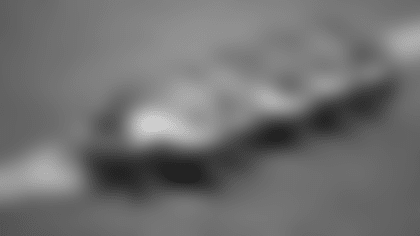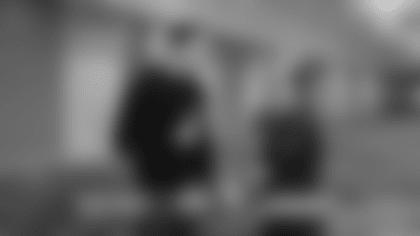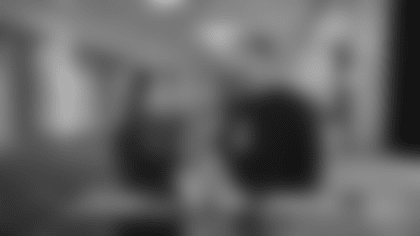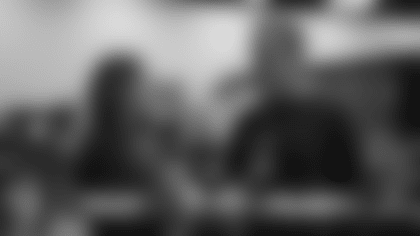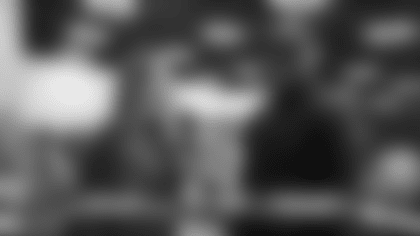The Vikings Children's Fund is in the process of distributing another round of grants to non-profit organizations that work to improve the lives of young people in the Upper Midwest.
The fund has raised more than $10 million since inception. The University of Minnesota's Department of Pediatrics has been awarded more than $5 million to support research that fights childhood diseases in that time, and nearly 80 organizations were granted funds in 2013.
Vikings Children's Fund Coordinator Patrick Leopold said Minnesota is fortunate to have so many organizations "who really care and do terrific work," and the Vikings are pleased to help their efforts.
"The Vikings Children's Fund was created in 1978 as a means for the players, coaches, the front office, the ownership group to focus in on their corporate giving," Leopold said. "We have many special events that happen over the course of the year. We do a lot of cause-related marketing programs with our corporate partners and typically raise somewhere around half a million dollars that we get out in the Upper Midwest."
The growth of the fund to distributing that amount annually is just part of the success story because the dollars that are distributed impact lives. The following recipients are examples of organizations committed to improving the lives of children through advancement in health and education.
FITNESS PLAYBOOK: A Community Health in Pediatrics grant awarded by the Vikings Children's Fund helped the University of Minnesota's Department of Pediatrics establish a "Fitness Playbook" that's been distributed to thousands of young people in the past four years.
"The program started with a dream of being fit and healthy, and the Vikings Children's Fund and the University of Minnesota were able to come together with some of those amazing funds that we get every year from them and say, 'Why don't we partner up and do something around tackling childhood obesity?'" said Nick Engbloom, Development Officer with the University of Minnesota Foundation. "We came up with this Vikings Fitness Playbook, almost like the players have their own playbook, let's give these kids who are battling with health and wellness issues. How can we give them a platform just like these Vikings have to learn the best ways to be healthy and fit?"
The playbook is a pocket-sized guide that encourages a combination of offense and defense to reduce childhood obesity. The offense that is encouraged is in the form of physical activity and includes charts that young people can use to set and meet goals. The defense that is encouraged is in the form of a healthy, balanced diet that features fruits, vegetables and whole grains.
"It gives really simple practical tips to kids and their families to get more active and make healthier eating choices," said Dr. Aaron Kelly, Associate Professor of Pediatrics and Medicine at the University of Minnesota. "One thing we know from the research is trying to make a lot of sweeping changes in eating behaviors and activities doesn't work real well. What tends to work better is making small, successive changes over time, and that's really what this is focused on."
Kelly said the playbook has helped distribute a message to young people during in-person school visits by Vikings players, cheerleaders and mascot Viktor and through E-field trips that have been implemented more recently. The E-field trips use video technology to increase distribution of the research-based strategies.
Kelly's primary focus is severe pediatric obesity, which is defined as having a body mass index at or above the 99th percentile and affects about four million children in the U.S. He said some of the support he's received has helped young people in the university's Pediatric Weight Management Clinic.
"We have used it to bring families in weekly to the university to meet with a dietician, to meet with an exercise specialist, to talk about behavioral modification," Kelly said. "In that way, it's had a great impact on these families who already struggle with obesity."
Kelly said research has shown the importance of addressing obesity early before co-morbidities that have been linked to obesity like heart disease and Type 2 diabetes affect patients later in life.
"Even in childhood, we have a fair amount of evidence in the context of severe pediatric obesity that some of these kids have sleep apnea, fatty liver disease, musculoskeletal problems, and importantly, many of these kids have depression or sub-clinical depression, anxiety, impulsivity, things like that," Kelly said. "It's not only an issue related to the body but also the mind."
Kelly previously designed a pilot study with a $10,000 grant from the Vikings Children's Fund that led to a $2 million grant from the National Institutes of Health to help put children on a healthy trajectory.
PAGE EDUCATION FOUNDATION: The Page Education Foundation was formed by former Vikings defensive tackle Alan Page when he was inducted into the Pro Football Hall of Fame in 1988 and has distributed post-secondary scholarships to nearly 6,000 students of color with help from the Vikings Children's Fund.
Diane Page, Volunteer Executive Director of the Page Education Foundation, said her husband wanted to establish an organization that helped stress to young people the importance of education the way that his parents emphasized that belief to him. After hearing about the plan, one of their daughters suggested that scholarship recipients could tutor and mentor younger people during the school year.
"We built that into the program and called it the 'Service to Children' project and require all of our scholars to work with little kids for 50 hours during the school year," Diane Page said.
She said the Vikings Children's Fund was the first entity the Page Education Foundation approached for assistance and the organization has received funding each year. The program has grown to include more than 550 scholars this year alone, and alumni of the program include academic and civic leaders, authors, professors, teachers, doctors and lawyers.
"It's incredible because what our Page Scholars are doing is instilling in young children the importance of education," Diane Page said. "A lot of these children they work with don't have anyone in their lives who has ever gone to college so they can talk to them about what college is, what it's like to go to college, why it's important to go to college. We've just had so many young children who have been mentored over the 27 years by Page Scholars, so you can imagine the impact it's had on the state of Minnesota and beyond."
The Vikings support Page Education Foundation's annual spring gala and purchased 100 copies of Alan and his Perfectly Pointy Impossibly Perpendicular Pinky, a children's book authored by Alan Page and daughter, Kamie, about individual differences like his pinky finger that was dramatically altered during his playing days. The books were donated to school libraries. Alan and Kamie Page enjoyed writing the first book together so much that they've also collaborated on The Invisible You, which was released in December. All proceeds from the sales of both books go directly to the Page Education Foundation.
To find out how to support Page Education Foundation, please visit www.page-ed.org.
ACES: Athletes Committed to Educating Students is an after-school tutoring and mentoring program that started in one school with 13 students and has grown to include more than 650 students in 11 schools with help from the Vikings Children's Fund and Vikings players. To learn more about aces, visit www.aces4kids.org.
ACES Executive Director Christina Saunders said ACES involves professional athletes and incentives offered by sports teams in the area to encourage completion of homework and good study habits.
"We have our own curriculum, which is a project-based curriculum, and it's aligned to the common core standards, so it supports what the schools are doing and teachers are teaching," Saunders said. "About 20 percent of the time is homework help, so the students are actually getting concrete feedback and help on their homework. We provide an adult in front of that child to give them reinforcement and confidence that they might not otherwise have in their lives, so a little is social-emotional (assistance) as well."
ACES Program Director Jeff Longenecker said participating students have enjoyed directly interacting with Vikings players during events and also benefitted from the Vikings Children's Fund.
"The money that the Vikings Children's Fund gives us allows us to provide incentives for participation, consistent attendance, for effort," Longenecker said. "We work on academics, but academics through personal development, and having that link for positive behaviors, consistent attendance is really helpful for our students, and the school administrations value that as an important component that ACES brings to it. The funds are providing high quality staff, they're also providing the incentives. They're allowing us to increase the content of our curriculum through continual review and improvement on what we're able to provide students. It's an integral and key piece to our quality programing."
Leopold said other non-profit organizations that would like help are encouraged to apply for a **Vikings Children’s Fund grant**.
"This is absolutely a terrific area, and there's a lot of great work that's done in our community," Leopold said. "We go through (the grant applications) over the course of the summer, our Board of Directors meets in the fall and awards the grants. If you're a charitable organization and a 501 (c)(3), and you're doing a great job in the community, we want to do all we can to try to help fund your organization."



